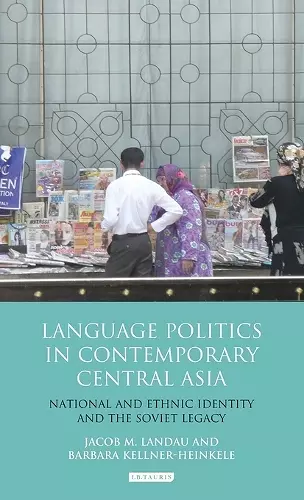Language Politics in Contemporary Central Asia
National and Ethnic Identity and the Soviet Legacy
Jacob M Landau author Barbara Kellner-Heinkele author
Format:Hardback
Publisher:Bloomsbury Publishing PLC
Published:13th Dec '11
Currently unavailable, and unfortunately no date known when it will be back

Nationalist leaders in the former Soviet states strive for national identity in both the political and cultural domains. Their language policies contend with Russian-speaking intelligentsias, numerous ethnic minorities and sizeable Russian communities backed by the Russian Federation - all presenting major challenges to facing the legacy of Soviet rule. Drawing on many years of research, interviews with educators and officials, and visits to the region, Barbara Kellner-Heinkele and Jacob M. Landau explore the politics of language and its intersection with identity in Azerbaijan, Kazakhstan, Kyrgyzstan, Tajikistan, Turkmenistan and Uzbekistan. With special attention to language education in schools and universities within each state and debates over bilingualism versus multilingualism, their insights offer researchers of politics, linguistics and Central Asian studies a comprehensive account of a highly politicised debate.
This book addresses some of the key issues in the field, including language as a symbol of identity, the de-Russianization process in Central Asia, Turkish influence in the region and the language challenges ahead. Long neglected by the world community, these countries are increasingly important because of their location, their resources, their increasing conflicts and the ways they express their nationalist sentiments through language choices. Language Politics in Contemporary Central Asia is an important book for both decision-makers and scholars. Brian Weinstein, Professor of Political Science, Howard University, Washington Prof. Landau and Kellner-Heinkele have been researching the republics of Central Asia since the 1990s and have a remarkable level of expertise. This book examines the contemporary picture of the largely Muslim republics of Central Asia in respect to language policies and their employment in public life, administration, the educational sphere and the media - showing government measures and responses in daily practice. In consideration of the growing importance of the region, this book would be of great interest to policy makers in the area and in the West, of interest to NGOs and to scholars of linguistics, contemporary history, Oriental studies cultural studies and education. This should be a key work of reference for years to come. Gyorgy Hazai, Member of the Hungarian Academy of Sciences, Budapest
ISBN: 9781848858206
Dimensions: unknown
Weight: 486g
288 pages